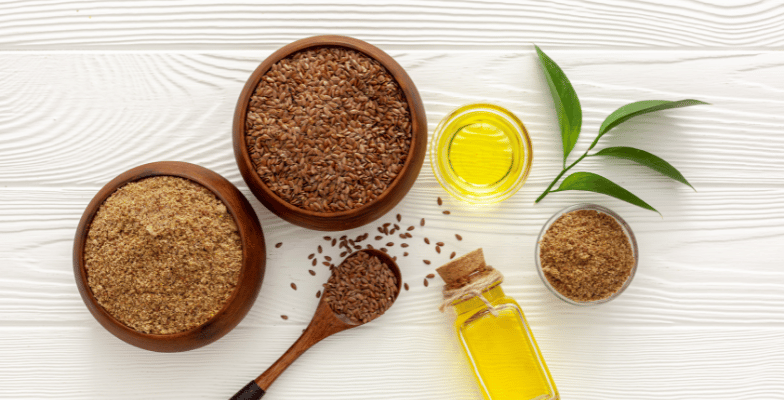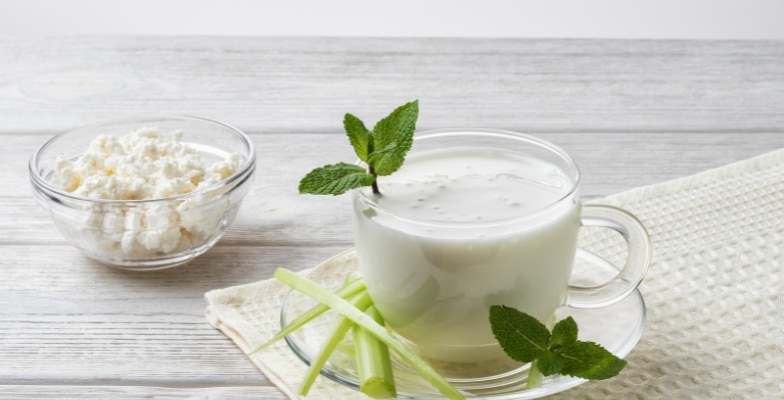What Is Flaxseed? Flaxseeds Nutrition Facts & Benefits
- Introduction
- Flaxseeds Nutrition Facts
- Forms Of Flaxseed
- Health Benefits Of Flaxseed
- Possible Flaxseed Side Effects
- Conclusion And My Suggestion

Introduction
Wherever flaxseeds become a regular food item among people, there will be better health.
~Mahatma Gandhi
We all know that diet has a significant role in preserving health and our body’s upkeep. The right diet can prevent or delay the occurrence of many diseases.
Before we resort to preventive and pharmacological care, we should switch to a wholesome and nutritious diet. This article will try to explain why many nutritionists recommend flaxseed as an integral part of our diet.
What Is Flaxseed?
Flaxseed, also known as linseed, belongs to the Linaceae family, which originated in Europe, Asia, and the Mediterranean region. Flaxseed is one of the oldest crops cultivated since the beginning of civilization. The Latin name of flaxseed is ‘Linum usitatissimum,’ which means ‘very useful.’
There is a small difference between the terms flaxseed and linseed. Flaxseed refers to flax consumed as food by humans, while linseed is used industrially for oil, animal feed, and fabric. Flax is an annual plant grown for its fiber and seeds, which have various health and industrial uses.
The entire flax plant is utilized commercially, either directly or after processing. Linen fabric is made from the cellulose fibers that grow inside the stalks of the flax plant. Flaxseeds are rich in omega-3, high-quality proteins, soluble and insoluble fiber, and lignans.
Flaxseed is of two varieties, golden flaxseed, which grows in cold climates, and brown flaxseed, which thrives in warmer and more humid climates. 1https://www.ncbi.nlm.nih.gov/pmc/articles/PMC2989356/
Flaxseeds Nutrition Facts
In addition to healthy fats (mostly unsaturated), protein, fiber, and lignans, flaxseed contains various vitamins and minerals. It is a good source of the amino acid tryptophan, lysine, tyrosine, and valine. 2https://fdc.nal.usda.gov/fdc-app.html#/food-details/169414/nutrients
Let’s look more closely at the main constituents of flaxseed. Flaxseed is the richest plant source of omega-3 fatty acid, i.e., alpha-linolenic acid (ALA), which is good for our hearts, brains, and the growth and development of our bodies. Each tablespoon of ground flaxseed contains about 1.8 mg of plant omega-3 fatty acids. The adequate intake is 1.6 g. 3https://ods.od.nih.gov/factsheets/Omega3FattyAcids-HealthProfessional/
Related Article: Omega 3 Fatty Acids Benefits And Daily Requirement
Lignans are plant compounds with antioxidant and estrogen properties, which can lower cancer risk and improve total health. Flaxseed contains 75-800 times more lignans than other plant foods. However, lignans are concentrated in the seed’s coat, so when flaxseed is pressed into oil, the lignans’ anti-cancer and antioxidant benefits are lost.
Dietary fiber helps regulate the digestive system and can lower bad cholesterol. Flaxseed has both soluble and insoluble dietary fiber. Fiber is found in whole and ground flaxseeds, not flax oil. 10 grams of flaxseed in the daily diet increases daily fiber intake by one gram of soluble fiber and three grams of insoluble fiber.
Related Article: What Is Fiber? Health Benefits, Food Sources And Daily Requirements
Forms Of Flaxseed
Whole Flax Seed
Whole flax seeds are small shiny brown seeds that give color and texture to salads, breakfast cereals, energy bars, and yogurts. Flaxseeds are used as an egg substitute in many recipes as they naturally become gelatinous once they absorb water.
Flaxseed Meal
A flaxseed meal is made by grinding the seeds into a powder that provides all the nutrients found in the whole flaxseed. One can add Flaxseed meals to smoothies, soups, stews, salads, sandwiches, chips, yogurts, and baked goods.
Most nutrition experts suggest consuming ground over whole flaxseed to get most of the benefits, as whole flax seeds may pass through the intestine undigested. In contrast, ground flaxseed is more comfortable to digest.
Flaxseed Oil
Flaxseed oil is extracted by cold-pressing whole flaxseed. The oil provides all the nutrients found in the flaxseed except fiber. Flaxseed oil is used in cooking and dressings and sealed in gel capsules for medicinal use. Buy flaxseed oil only in small dark bottles, store it in the refrigerator, and avoid heating it.
One tablespoon of flaxseed meal contains 1.6 grams of omega-3, while one tablespoon of flaxseed oil contains 7 grams. Flaxseed oil capsules are a dietary supplement used for constipation, diabetes, high cholesterol, and cancer. 4https://www.nccih.nih.gov/health/flaxseed-and-flaxseed-oil Flaxseed is fed to chickens to lay ‘omega-3 eggs’-eggs with higher omega-3 fatty acid content.
Flax milk is a healthy alternative to almond milk. It is high in ALA, calcium, and vitamins A and D. It contains no cholesterol or lactose and is desired by people allergic to soy, nuts, and gluten. 5https://nutritiondata.self.com/facts/custom/3596377/
Health Benefits Of Flaxseed
Flaxseed is one of the foods most often studied in diet and disease research due to its potential health benefits.
Improves Cholesterol And Heart Health
The American Heart Association (AHA) recommends consuming more fiber and omega-3s to boost heart health. Research suggests that omega-3s in flaxseed helps the cardiovascular system through several mechanisms, including anti-inflammatory action and normalizing heartbeat. 6https://www.ncbi.nlm.nih.gov/pmc/articles/PMC2951311/
Flaxseed is the richest source of SDG (secoisolariciresinol diglucoside), an essential lignan with antioxidant, antihypertensive, antidiabetic, and anti-inflammatory properties. SDG aids in the treatment of coronary artery disease, stroke, and peripheral arterial vascular diseases. 7https://pubmed.ncbi.nlm.nih.gov/26561066/
Lignans in flaxseed assist in decreasing coronary heart disease and cardiovascular disease mortality. 8https://pubmed.ncbi.nlm.nih.gov/28472215/ , 9https://pubmed.ncbi.nlm.nih.gov/20883417/ Several studies suggest that diets rich in omega-3s can help prevent hardening and plaque deposits in the arteries by keeping white blood cells from sticking to the blood vessel’s inner lining.
Eating flaxseed may also help normalize cholesterol levels. A high LDL or ‘bad’ cholesterol level is linked to an increased risk of heart disease, obesity, diabetes, and metabolic syndrome. A study of menopausal women suggested a decrease in LDL after the women ate four tablespoons of ground flaxseed every day for a year.
In 2010, a study was conducted to understand the effect of flaxseed on cholesterol levels in men with moderately high cholesterol. It suggested that dietary flaxseed might be useful for lowering cholesterol levels. 10https://pubmed.ncbi.nlm.nih.gov/20797475/ Some researchers have also linked omega-3 oils to a reduced risk of cardiovascular disease.
Researchers have suggested that flaxseed could offer a plant alternative to marine sources of omega 3, a useful convenience for people who follow a plant-based diet. 11https://www.ncbi.nlm.nih.gov/pmc/articles/PMC2989356
Helps Manage Diabetes
Various types of research suggest that daily flaxseed intake may modestly improve blood sugar. A study suggested ingestion of flaxseed has a positive impact on diabetics and pre-diabetics.
Lignans and other phytoestrogens in flaxseed may modestly improve blood sugar. 12https://scialert.net/fulltext/?doi=jms.2015.135.138 The data also suggest that SDG may significantly reduce type 1 diabetes and delay type 2 diabetes in humans. 13https://pubmed.ncbi.nlm.nih.gov/26561065/
Contains Anti-Cancer Properties
Flaxseeds have three types of phenolic compounds: phenolic acid, flavonoids, and lignans, all well known for their anti-cancer and anti-oxidative properties. 14https://obgyn.onlinelibrary.wiley.com/doi/abs/10.1111/jog.13982 Lignans are a type of phytoestrogen, a plant-based nutrient that acts similarly to estrogen.
There has been concern that phytoestrogens may increase breast cancer risk, but recent research suggests they may play a protective role. 15https://www.ncbi.nlm.nih.gov/pmc/articles/PMC5808339/
Human studies are limited but suggest that consuming one to four tablespoons of flaxseed daily might reduce breast cancer risk, especially in post-menopausal women. 16https://link.springer.com/article/10.1007/s10552-013-0155-7
Ayurveda encourages the consumption of flaxseed and its products to promote overall health, maintain the skin’s pH balance, and prevent chronic conditions such as diabetes, atherosclerosis, arthritis, and cancer.
Possible Flaxseed Side Effects
Due to its very high omega-3 fatty acid content, flaxseed can become rancid through oxidation and prone to bitterness. The nutrients in flaxseeds may not benefit everyone. People should avoid flaxseed or any of its products if they use blood thinners, including aspirin, are pregnant or breastfeeding, or are allergic to flaxseed.
Patients with acute inflammatory illnesses of the intestine or stomach should avoid eating flaxseed. Eating raw or unripe flaxseed can be harmful as it may contain potentially toxic compounds. 17https://www.nccih.nih.gov/health/flaxseed-and-flaxseed-oil.
Conclusion And My Suggestion
It is clear that flaxseed has numerous benefits, and regular consumption can boost our health. The final take on flaxseed is a sustainable, tiny, yet significant plant source of essential omega-3 fatty acids, lignans, dietary fiber, high-quality proteins, and antioxidants.
Flaxseed is a nutritious and functional food. We can create foods containing moderate amounts of flaxseed to include in our everyday diets.
What do you think about this article? Have any questions? Let me know in the comments below!

Skill-Based Education.
Global Recognition.
Powerful Community Building
Secure a certificate of completion in as little as a day by graduating from one of our free courses.
Get Access to Our Free Courses. No Credit Card Required.

Fabulous Body Membership
Your All-Access Pass to A Fabulous Body & A Rewarding Career
25+ Certificate Courses & Programs, All Included
15 Day Free Trial, 100% Money-Back Guarantee
About Kamini Thakar
Kamini is a very skilled writer/content creator. As a part of Fabulous Body for years, she has authored many articles really proving her prowess in acquiring and presenting knowledge about various health & nutrition topics.










